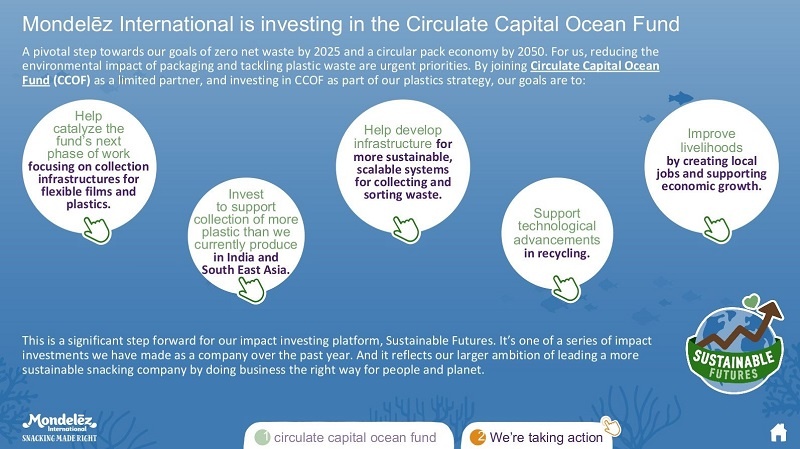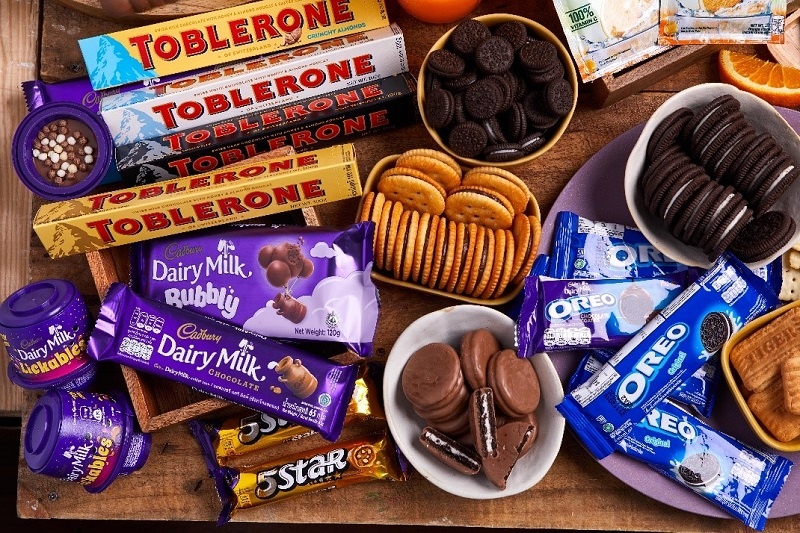Mondelēz International advances commitment to help create circular economy for plastics
The goal of this investment, which is part of Mondelēz International’s Sustainable Futures impact investing platform, is to enhance focus on the physical collection of flexible films – lightweight, multi-layer plastics used by the snacking industry – that have traditionally been more difficult to collect, sort, recycle, and ultimately reuse.
 |
| Mondelēz International is investing in the Circulate Capital Ocean Fund |
CCOF is an investment fund dedicated to addressing India and Southeast Asia’s plastics challenges, and its investors include some of the world's leading consumer packaged goods companies. The fund provides financing to waste management, recycling, and circular economy startups and small- and medium-sized enterprises across India, Indonesia, Thailand, Vietnam, and the Philippines.
CCOF helps identify collection and recycling solutions, catalyses capital to both scale and replicate those solutions and connects these enterprises to the world’s leading companies. Mondelēz International’s investment in CCOF is expected to finance enterprises that support the company’s goal to collect more plastic waste than the company currently produces across India and Southeast Asia and will further CCOF’s investments into flexible plastic waste collection, recycling, and infrastructure enterprises.
“This investment marks a pivotal step forward in our contribution to a circular economy for plastics and is a clear demonstration of our long-term goal of net-zero waste,” said Dirk Van de Put, chairman and CEO, Mondelēz International. “As part of our ambition to become a more sustainable snacking company, this partnership will help fund businesses that are trying to fill systemic gaps in the collection, sorting and reuse of plastic waste, including flexible film.”
Mondelēz International has already made significant progress toward its packaging recyclability targets. The company has removed 65,000 tonnes of packaging from its portfolio since 2013 and remains on track to achieve its 2025 goals to reduce virgin plastic use in rigid plastic packaging by 25 per cent or reduce virgin plastic in its overall plastic packaging portfolio by 5 per cent, assuming constant portfolio mix compared to 2020, increase use of recycled content to 5 per cent by weight across plastic packaging and design 100 per cent of its packaging to be recycle ready. To date, around 94 per cent of all of the company’s packaging is designed to be recycle ready.
 |
| Mondelēz International has made significant progress toward its packaging recyclability targets |
“In Southeast Asia, the issue of marine litter is a complex one that requires the contributions of all private and government stakeholders,” adds Glenn Caton, Southeast Asia president of Mondelēz International. “There needs to be concentrated effort to build infrastructures for collecting and diverting waste. As well as growing the market for recyclables, to make collecting and recycling them cheaper and easier. Because the problem is so systemic, we are working with industry and stakeholder groups to identify the barriers in the local community, working with legislators to create equitable policies which support plastic collection industries, and supporting small enterprises to help grow the circular economy, where plastic is used as a resource rather than viewed as waste.”
What the stars mean:
★ Poor ★ ★ Promising ★★★ Good ★★★★ Very good ★★★★★ Exceptional
Related Contents
Latest News
More News
- Ho Chi Minh City launches plan for innovation and digital transformation (February 25, 2026 | 09:00)
- Vietnam sets ambitious dairy growth targets (February 24, 2026 | 18:00)
- Masan Consumer names new deputy CEO to drive foods and beverages growth (February 23, 2026 | 20:52)
- Myriad risks ahead, but ones Vietnam can confront (February 20, 2026 | 15:02)
- Vietnam making the leap into AI and semiconductors (February 20, 2026 | 09:37)
- Funding must be activated for semiconductor success (February 20, 2026 | 09:20)
- Resilience as new benchmark for smarter infrastructure (February 19, 2026 | 20:35)
- A golden time to shine within ASEAN (February 19, 2026 | 20:22)
- Vietnam’s pivotal year for advancing sustainability (February 19, 2026 | 08:44)
- Strengthening the core role of industry and trade (February 19, 2026 | 08:35)

 Tag:
Tag:




















 Mobile Version
Mobile Version